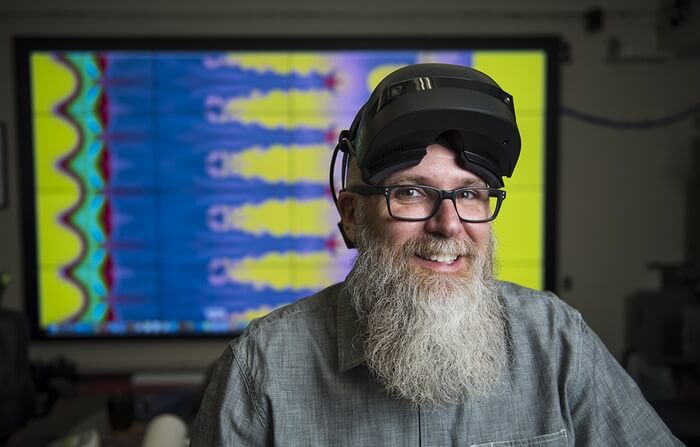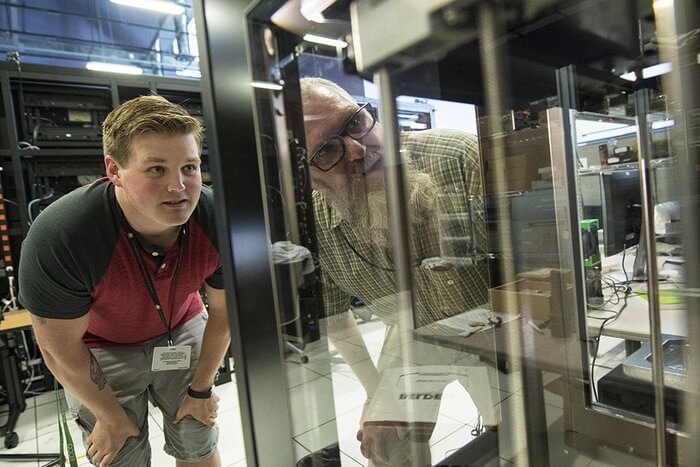NIU has named computer scientist Michael E. Papka, director of the Data, Devices, and Interaction Laboratory (ddiLab), as a 2020 Presidential Research, Scholarship and Artistry Professor.
The award is the university’s top recognition for outstanding research or artistry. Award winners receive special financial support of their research for four years, after which they carry the title of Distinguished Research Professor.
Papka is an expert in supercomputing and big data visualization. His research has helped create cutting-edge, complex virtual-reality and visualization systems that enhance understanding of huge data sets and often uncover hidden information.

Professor Michael Papka from the Department of Computer Science has been named a 2020 Presidential Research, Scholarship and Artistry Professor.
In the past, Papka has helped colleagues in various fields model and visualize brain blood flow, star explosions, climate simulations and even the jobs running on thousands of nodes of a supercomputer. His laboratories at NIU and at Argonne National Laboratory, where he holds various leadership roles, feature cutting-edge display walls for such images and visualizations.
“Mike’s research has had a significant positive impact not only in computer science, but also in the many other disciplines where his work has been applied,” NIU Computer Science Department Chair Nicholas Karonis said. “These areas include high-energy physics, computational engineering, molecular dynamics, medical imaging, astrophysics and neurology.”
An NIU alumnus, Papka joined NIU’s computer science department in 2012 having already had a distinguished career at Argonne, a U.S. Department of Energy national laboratory located in Lemont, and one of the world’s leading research institutions.
In 2007, Papka won a prestigious R&D 100 Award as part of the team that developed Access Grid 3.0, an advanced technology that enables groups of people to collaborate using open source standards and internet technology. His 2011 paper on multiscale simulations of brain blood flow placed him as a finalist for the ACM Gordon Bell Prize, which recognizes outstanding achievement in high-performance computing.
At Argonne, Papka serves as division director of the Argonne Leadership Computing Facility, which will oversee deployment of the nation’s first exascale supercomputer system. The system will be capable of a billion billion calculations a second and will support new types of computational science workloads, including data and learning jobs, which will give researchers an unprecedented set of tools to address scientific problems.

Matt Rycraft, who graduated with his computer science degree in the spring of 2019, working with Professor Michael Papka at Argonne National Laboratory.
“Mike has made a significant positive impact on the field of computer science,” said Rick Stevens, Argonne associate laboratory director for Computing, Environment and Life Sciences. “He will undoubtedly continue to contribute to the discipline at the highest level.”
Papka has published more than 100 peer-reviewed publications in journals and conference proceedings. He has been a lead investigator on research projects at Argonne, where he holds the position of Senior Scientist, and at the University of Chicago, where he currently serves as a Senior Scientist At-large with the UChicago Consortium for Advanced Science and Engineering.
Additionally, he has lent his expertise to some of the nation’s leading advisory boards, including Loyola University Chicago’s Computer Science Advisory Committee and Harvard University’s Computational Science and Engineering Advisory Board.
At NIU, where he earned his undergraduate degree in physics, Papka now directs student researchers—from Research Rookies to graduate students—and teaches computer science courses on virtual reality, data and information visualization, and data structures and algorithms.
He founded and now co-directs NIU’s ddiLab to enable student investigations of how computing supports discovery. Additionally, at Argonne, he has mentored or supervised the research of more than 100 summer interns, graduate students and postdoctoral appointees, including many NIU students.
His current research includes the UChicago Array of Things (AoT) project that aims to analyze data from a vast array of sensors located throughout Chicago. He also is heavily involved in the Argonne- and Northwestern University-led Sage project, which aims to build a continent-spanning network of smart sensors to monitor ecosystems and urban infrastructure.
Papka said his earliest exposure to scientific research came while still an undergraduate student, when he worked part-time analyzing data for physics experiments at Fermi National Accelerator Laboratory in Batavia.
“That experience ultimately led to me to Argonne and to my career as a scientist, and later on, as a decision maker at the laboratory,” Papka said. “I decided to return to an academic setting because I know how an early exposure to research opportunities can put students on a path to a successful research career—and we need more bright minds involved in research.”
